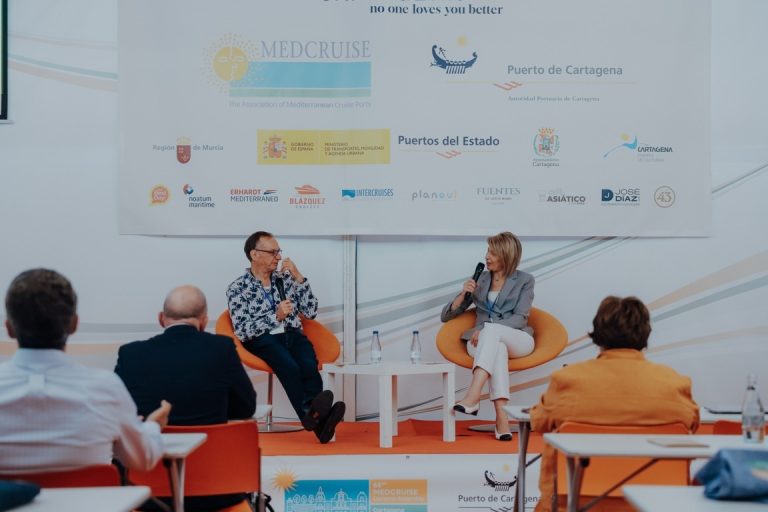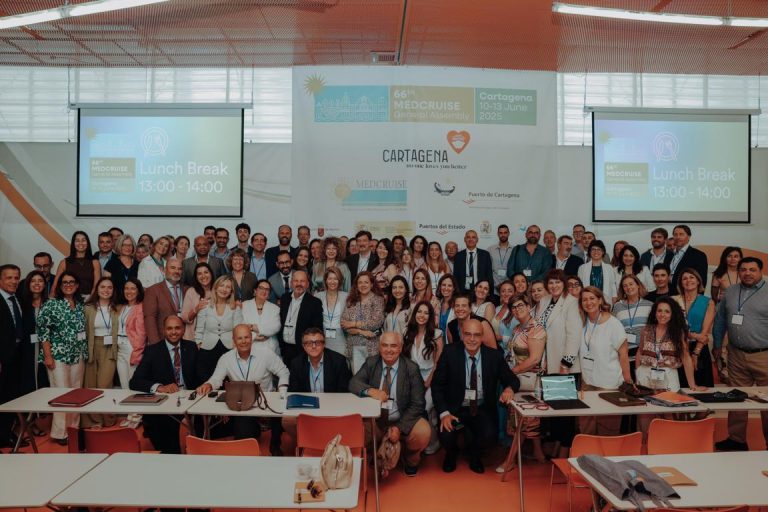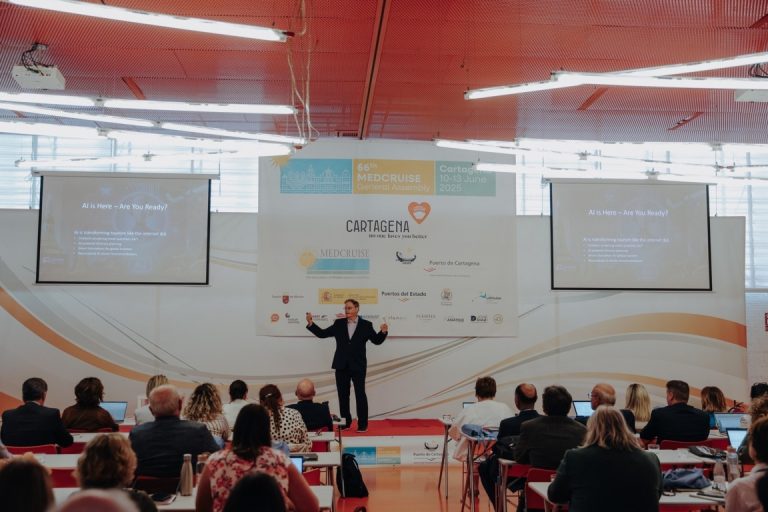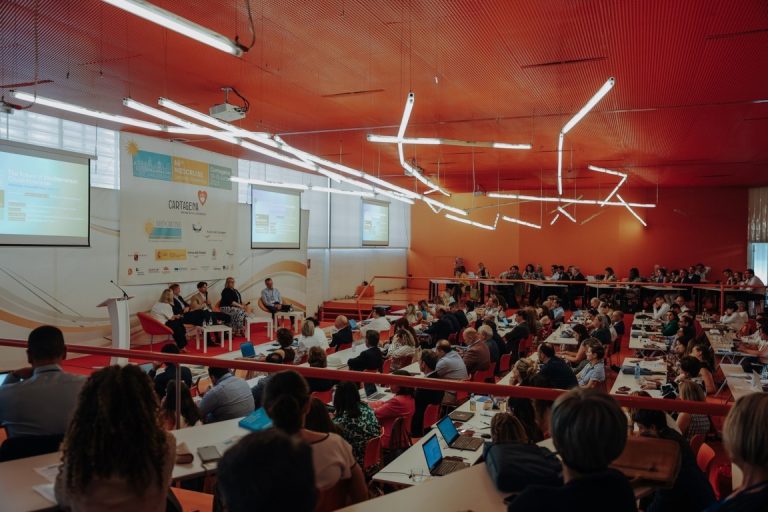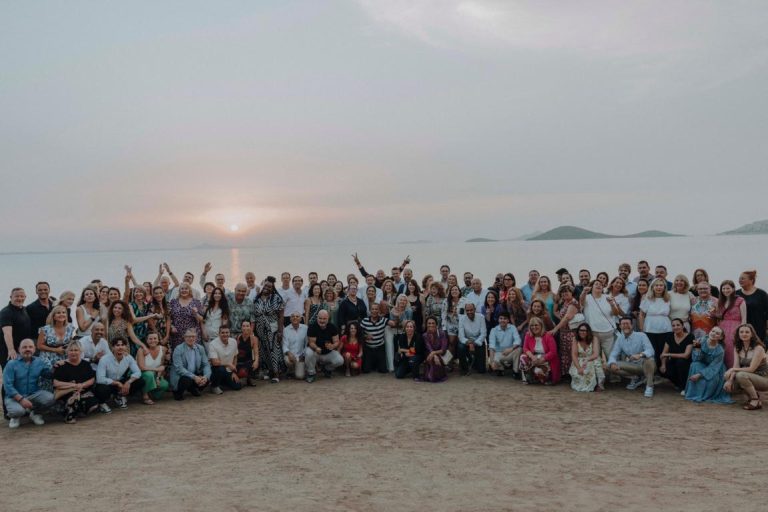Cartagena Hosts the 66th MedCruise General Assembly
From June 10 to 13, 2025, the historic port city of Cartagena, Spain, successfully hosted the 66th General Assembly of MedCruise, today the largest cruise ports association in the world.
The event took on a particularly symbolic meaning as it coincided with the celebration of the 150th anniversary of the Port of Cartagena. A perfect setting, therefore, to bring together over 165 participants including representatives from more than 20 cruise companies, 47 member ports, 22 associate members, and 8 international media outlets. The meeting, held at the El Batel Auditorium, represented a crucial moment to reflect on the future of the cruise industry in the Mediterranean, focusing on sustainability, technological innovation and integration with local communities.
Theodora Riga In Conversation With Giora Israel
The Assembly officially began with a press conference held in the evocative setting of the Roman Theatre Museum of Cartagena. The President of the Port Authority of Cartagena, Pedro Pablo Hernández, opened the proceedings by highlighting the transformation experienced by the city over the last 25 years. From just 49 cruise calls and 68,000 passengers in 2009, Cartagena recorded record numbers in 2025: 192 calls and 250,000 passengers. There was a clear desire to transform Cartagena not only into a transit point for tourists but into a true cultural and sustainable destination. The city, with its 17 museums, numerous archaeological sites and intense museum and cultural activity, represents a model of heritage enhancement in service of tourism.
This success was made possible thanks to effective synergy between public institutions and continuous infrastructural improvements, which have made the city one of the emerging destinations in the Mediterranean cruise panorama.
Anne-Marie Spinosi, Senior Vice President of MedCruise and Cruise Manager of Corsica Ports speaking on behalf of The President of MedCruise and President of the Port of Corfu, Theodora Riga, emphasised the strategic importance of the event, underlining how Cartagena offered not only a fascinating historical and cultural framework but also a concrete example of port transformation guided by vision and collaboration. Anne-Marie Spinosi also highlighted that the main challenge for ports and destinations today is to intercept global changes and respond promptly and flexibly to the new demands of the cruise market. Providing a simultaneous translation for English to Spanish was Luz Marina Espiau Moreno, member of the Board of Directors of MedCruise and Head of Commercial and Business Development at the Port Authority of Santa Cruz de Tenerife.
During the General Assembly, three new associate members joined the Association: Amalfi Coast Cruise Terminal – Port of Salerno (Italy), Gelasakis Shipping Agency (Greece) and Global Cruises LLC (USA/Greece). These new entries demonstrate the constant expansion of the MedCruise network and the desire of the association to strengthen international collaboration.
MedCruise 66th GA (1)
The beating heart of the General Assembly was a rich programme of discussion panels, which offered participants the opportunity to engage in discussions on strategic issues for the evolution of the cruise sector. Industry leaders took turns in high-level working sessions, addressing current challenges and future prospects with a collaborative and innovation-oriented spirit.
The first discussion, dedicated to the evolution of cruise itineraries in the Mediterranean, highlighted a paradigm shift in how companies plan their routes. Moderated by Virginia López Valiente, CEO of Cruise News Media Group, the panel brought together experienced voices such as Giora Israel, President of Giora Israel LLC; Crystal Morgan, Senior Director of Deployment & Itinerary Planning at Seaborn; Simone Frontini, Senior Analyst of Itinerary & Planning at Costa Crociere; and Mark Robinson, General Manager of BC Tours. The conversation focused on the growing demand from travellers for more immersive experiences, including overnight stays in ports and a way to experience destinations more authentically and relaxedly. The speakers emphasised how flexibility has become a fundamental lever, not only to meet passengers’ new expectations but also to adapt to constantly changing operational conditions. At the core of the discussion was also sustainability: no longer an added value, but an essential criterion to design responsible itineraries compatible with host communities.
No less stimulating was the presentation dedicated to artificial intelligence and digitalisation in tourism services, which explored how emerging technologies are redefining the cruise passenger experience. Delivered by Eric Benedict, Vice President of Access Cruise Inc, the session highlighted the impact of digital tools such as multilingual chatbots, predictive analytics systems, and personalised marketing platforms. A notable case was Benidorm, where the integration of technology and tourism management led to a more efficient and engaging interaction with visitors. A clear trend emerged toward greater proactivity in destination management, where data and artificial intelligence become allies to anticipate needs, improve services, and strengthen the emotional bond with travellers.
The Future of Destination Services & AI
Another central theme concerned the relationship between the cruise industry and local communities. The panel titled “Cruise Passenger Experience & Community Engagement,” moderated by Laura Cimaglia, Vice President of MedCruise and Manager of the Port of Taranto, proposed an innovative people-centred approach. The speakers, Jon Olav Stedje, Manager of Sustainability & Community Engagement at MSC Cruises; Abigail Crossley, Senior Manager of Global Sourcing Shore Excursions at Carnival Corporation; Jose Sanchez, Director of Agenda AIVP 2030, Projects and Content at AIVP; Hortensia Sanchez, Head of Business Development at the Port Authority of Cartagena; and Ioannis Bras, CEO at Five Senses Consulting, stressed the importance of making communities protagonists, not mere spectators of the cruise experience. The need to reduce the negative impact of tourist influx in urban centres and to guarantee tangible economic and cultural benefits for local populations was discussed. Among the most appreciated concepts was the idea of considering crew members as “cultural bridges,” capable of mediating and enhancing relationships between passengers and territory.
The commitment to a greener future was instead at the centre of the panel “Charting a Greener Course,” which compared different strategies to promote ecologically sustainable cruising. Moderated by Valeria Mangiarotti, member of the Board of Directors of MedCruise and Marketing Manager at the Port Network Authority of the Sardinian Sea, the meeting featured interventions from representatives such as Sacha Rougier, Vice President of Itinerary Planning and Destination Experiences at Orient Express; Sylviane De Tracy, Director of Cruise Research & Development at PONANT; Ana Lourenço, Manager of Cruise and Marina at the Port of Lisbon and Francesca Antonelli, Head of Cruises & Marketing at the Port of Valencia. The topics covered were multiple: from reducing CO₂ emissions to adopting alternative fuels such as LNG, from implementing OPS to the rational use of water resources at terminals. Cartagena was cited as a virtuous example in this field, thanks to the adoption of cutting-edge technologies to power ships from land and its integrated environmental strategy.
Finally, the discussion on port infrastructure represented a moment of great strategic importance. The panel “Looking to the Future of Port Infrastructure,” led by Anne-Marie Spinosi, Senior Vice President of MedCruise and Cruise Manager of Corsica Ports brought together Odette McFarlane, Director of Port & Shore Operations at Carnival UK; Fiona Noone, Manager of Marine Planning and Port Operations at Marella Cruises; Gilson Cruz, Member of the Board of Directors of MedCruise and Director of the Board of Directors Cabinet at the Ports of Cabo Verde and Serafin Blazquez, Executive Director of Operations at Cruise Saudi. The focus was on how to design flexible port infrastructures capable of adapting to the continuously evolving needs of cruise traffic. The solutions presented included the integration of intelligent systems for flow management, accessibility for all types of vessels, from large fleets to niche brands, and the adoption of sustainable construction criteria. The shared goal was to envision future ports that are not only more efficient but also more human, welcoming, and integrated within the urban context.
The Future of Mediterranean Cruise Itineraries panel
Alongside the intense days dedicated to institutional work and networking meetings, the Assembly aimed to offer participants an authentic immersion into the cultural and scenic richness of the territory. On the final day of the event, a series of field experiences were organised to allow guests to discover some of the most fascinating gems of the region.
One of the most evocative activities was the panoramic catamaran tour through the historic port of Cartagena. Participants were able to admire the city from the sea, appreciating the harmony between the modernity of port infrastructures and the ancient charm of its monuments. Following this, a cultural itinerary guided visitors through traces left by the Roman era and elegant examples of modernist architecture, offering a comprehensive view of Cartagena’s artistic and urban heritage.
A second group chose to experience the marine environment of Cabo de Palos, a coastal location renowned for the beauty of its landscapes and the clarity of its waters. The excursion was enriched by a coastal tour, moments of relaxation dedicated to swimming and a traditional lunch featuring fresh fish, celebrating local gastronomic excellence.
Finally, another itinerary led participants to discover the nearby city of Murcia. Here, the visit touched on some of the symbolic sites of the regional capital from the majestic Cathedral to the refinement of the Royal Casino, up to the vibrant and authentic heart of the historic centre.
These excursions, designed not only as leisure moments but as true cultural experiences, helped strengthen the image of Cartagena and its hinterland as welcoming and genuine tourist destinations, capable of perfectly combining tradition and innovation, respect for the environment, and territorial promotion. The harmonious integration between the world of the cruise industry and the cultural and natural fabric of the region was evident to all, consolidating the message of sustainable, aware tourism deeply connected to local identities.
The organisers of the Assembly received widespread acclaim from regional and local institutions, which publicly recognised the value of the event and its impact on the territory.
Among the most authoritative voices was Juan Francisco Martínez, director of the Instituto de Turismo de la Región de Murcia (ITREM), who defined Cartagena as the true “tourist capital of the Murcia Region.” In his statements, Juan Francisco Martínez highlighted how hosting the MedCruise Assembly in this city is not only a recognition of its recent development but also an extraordinary opportunity to strengthen its international positioning, enhancing its potential as an excellent Mediterranean destination.
MedCruise 66th GA
Words of appreciation also came from the Mayor of Cartagena, Noelia Arroyo, who expressed great satisfaction with the positive outcome of the event. Noelia Arroyo emphasised the fundamental role played by the cooperation between public administrations, port authorities, and tourism operators, a strategic alliance that allowed the best possible reception of international delegates and the promotion of a cohesive and dynamic image of the city. The mayor also highlighted the importance of the cruise industry as a key tool to counteract the seasonality of tourist flows, hoping for a development model capable of ensuring a steady presence of visitors throughout the entire year.
The 66th MedCruise General Assembly concluded as a highly successful event, able to combine business, culture, and strategic vision. The topics addressed initiated a deep and constructive dialogue on how to tackle the challenges of the cruise sector by promoting innovative, sustainable, and inclusive models.
The unanimous praise from participants confirmed that Cartagena, with its history, culture and commitment to sustainability, today represents one of the most promising destinations in the Mediterranean. The joint work of MedCruise, the Port Authority, the Municipality, and all involved partners gave rise to an event that will long remain in the participants’ memory. Cartagena has demonstrated to be not only a port but an authentic cultural gateway to the Mediterranean.
Don’t miss updates, news and reviews about the world of cruises on Cruising Journal.

